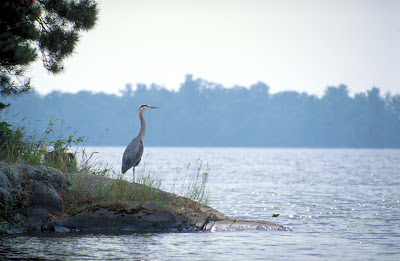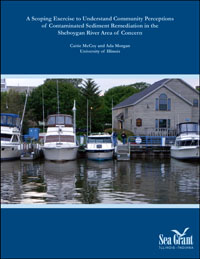 The Great Lakes Legacy Act project began with the development of a master plan and secured funding, with the goal of cleaning and restoring the lake’s natural habitats. By doing so, fish and wildlife populations can be restored, and the lake will be cleaner and safer for recreational use as well.
The Great Lakes Legacy Act project began with the development of a master plan and secured funding, with the goal of cleaning and restoring the lake’s natural habitats. By doing so, fish and wildlife populations can be restored, and the lake will be cleaner and safer for recreational use as well. Category:
Muskegon Lake cleanup project celebrates completion
May 23rd, 2012 by Irene Miles The Great Lakes Legacy Act project began with the development of a master plan and secured funding, with the goal of cleaning and restoring the lake’s natural habitats. By doing so, fish and wildlife populations can be restored, and the lake will be cleaner and safer for recreational use as well.
The Great Lakes Legacy Act project began with the development of a master plan and secured funding, with the goal of cleaning and restoring the lake’s natural habitats. By doing so, fish and wildlife populations can be restored, and the lake will be cleaner and safer for recreational use as well. Hands-on water quality projects continue for NW Indiana students
May 1st, 2012 by Irene Miles On April 19, Caitie McCoy invited Education Specialist Terri Hallesy, to visit Andrea Bock’s 4th grade science classrooms at East Chicago Lighthouse Charter School. The students have been learning about the Great Lakes Legacy Act cleanup project at Roxana Marsh and how to design a habitat. Jack Brunner, an EPA contractor whose employees work on-site at Roxana Marsh, was invited as a guest speaker to share his restoration work with the students. Caitie McCoy and colleague, Nishaat Yunus, actively engaged students in a discussion about key concepts associated with habitats and restoration projects. Students participated in a hands-on activity to design their own Roxana Marsh habitat by constructing a colorful classroom mural. Students were divided into groups and provided with photos depicting various elements contained within a habitat. Selected photos included nonliving elements, such as the sun and oxygen; above water living plants like black-eyed Susan and wild bergamot; and above water living animals such as the great blue heron and Peregrine falcon. Using various art tools, students designed and illustrated some of the components that comprise the Roxana Marsh habitat. Caitie McCoy and Terri Hallesy affixed the students’ creative illustrations onto a mural, which is now proudly displayed in their classroom. As a culminating event, Jack Brunner surprised the students by presenting a painted turtle that was found on the Roxana Marsh site and has been kept as a pet during the cleanup. The next step in this exciting restoration project will involve the students actually visiting Roxana Marsh to plant natives they’ve been cultivating in their classroom.
On April 19, Caitie McCoy invited Education Specialist Terri Hallesy, to visit Andrea Bock’s 4th grade science classrooms at East Chicago Lighthouse Charter School. The students have been learning about the Great Lakes Legacy Act cleanup project at Roxana Marsh and how to design a habitat. Jack Brunner, an EPA contractor whose employees work on-site at Roxana Marsh, was invited as a guest speaker to share his restoration work with the students. Caitie McCoy and colleague, Nishaat Yunus, actively engaged students in a discussion about key concepts associated with habitats and restoration projects. Students participated in a hands-on activity to design their own Roxana Marsh habitat by constructing a colorful classroom mural. Students were divided into groups and provided with photos depicting various elements contained within a habitat. Selected photos included nonliving elements, such as the sun and oxygen; above water living plants like black-eyed Susan and wild bergamot; and above water living animals such as the great blue heron and Peregrine falcon. Using various art tools, students designed and illustrated some of the components that comprise the Roxana Marsh habitat. Caitie McCoy and Terri Hallesy affixed the students’ creative illustrations onto a mural, which is now proudly displayed in their classroom. As a culminating event, Jack Brunner surprised the students by presenting a painted turtle that was found on the Roxana Marsh site and has been kept as a pet during the cleanup. The next step in this exciting restoration project will involve the students actually visiting Roxana Marsh to plant natives they’ve been cultivating in their classroom.GLRRIN Lake Michigan partners examine future of Lake Michigan food webs
April 11th, 2012 by Irene MilesThe term “food web” is used to describe the intricate relationships between the many different plants, animals, and organisms that can exist in small or large areas. Understanding food webs in specific environmental locations, such as in one or more of the Great Lakes, can help researchers and communities better respond to changes in those delicate systems. Invasive species are just one example of a potential influence that can drastically alter a food web and have substantial impacts on native environments.
Study examines community perceptions of river remediation
April 9th, 2012 by Irene MilesCommunication is a crucial part of any project, and especially one as significant as cleaning up an ecosystem that has been deemed an Area of Concern. One of those AOCs is the Sheboygan River, and Illinois-Indiana Sea Grant Environmental Social Scientist Caitie McCoy has been very involved in the remediation project, working with and reaching out to the communities that live near and rely on the river in a variety of ways.
To better understand community views and concerns about the river and the river cleanups going on this summer, several interviews were conducted with local stakeholders. The findings and resulting recommendations are presented in a qualitative study put together by Caitie and Ada Morgan, entitled “A Scoping Exercise to Understand Community Perceptions of Contaminated Sediment Remediation in the Sheboygan River Area of Concern.” You can download and read the entire study here.
Recent News
- Sea Grant Chats: Looking back on our AIS legacy as we move forward
- National Sea Grant welcomes 2026 Knauss Marine Policy Fellowship finalists
- IISG’s new year starts with a new research and reporting coordinator
- Ripple Effects curriculum engages students on the spread of aquatic invasive species
- Coastal communities can tap into IISG resources as they manage beach sand and structures
IISG Instagram
🚨Attention Educators🚨Saturday, February 28th at 11:59 pm CT is the deadline to apply for the Shipboard Science Immersion on Lake Superior.
Learn more and apply today at the link in bio.
This program is made possible by Illinois-Indiana Sea Grant and CGLL with funding and support from EPA, NOAA, and the Great Lakes Restoration Initiative.

Managers and researchers can be faced with a need to classify the risk of new crayfish invaders. Rapid assessment tools, such as the Science-based Tools for Assessing Invasion Risk (STAIR), can assist in this process by providing a streamlined framework for analysis and decision-making.
Join us for an ICC webinar with John Bieber from Loyola University Chicago to learn how rapid assessment tools are used to classify invasive species risk and how STAIR can support invasive crayfish management.
Learn more at the link in bio.

Join us for a hands-on @projectwet Make-and-Take Workshop in Chicago!
📅 When: March 12, 2026 from 9:00 AM – 3:30 PM CT
📍 Where: 200 S Wacker Dr., Chicago, IL
💲 Cost: $25 (includes classroom-ready activity kits, lunch & refreshments)
🗓️ Registration closes February 26.
✅ Open to 3rd–8th grade formal & informal educators
✅ Earn 6 PD hours
✅ Leave with ready-to-use water education kits aligned to Common Core & NGSS
👉 Don’t miss out—space is limited!
Learn more and register at the link in bio.

Explore the history, impact, and educational power of Meaningful Watershed Educational Experiences (MWEEs).
eeLEARN: MWEE 101 is a free, self-paced online course that walks you through the MWEE framework with examples, planning tools, and downloadable resources that you can use immediately.
Start learning today at the link in bio.

Categories
- Aquaculture
- Aquatic Invasive Species
- Buoys
- Climate Ready Communities
- Coastal Resilience
- Director's Blog
- Education
- Featured
- Fellowships
- Fisheries
- Funded Research
- Funding
- Great Lakes Cleanup
- Great Lakes Data
- Healthy Waters
- Internships
- Jobs
- K-12 Education
- News
- Photos
- Program
- Recreation & Tourism
- Resources
- Sea Grant Scholars
- Stormwater & Green Infrastructure
- Sustainable Community Planning
- The Helm
- Uncategorized
- Video
- Water Resource Economics


